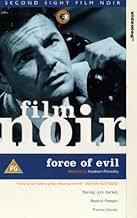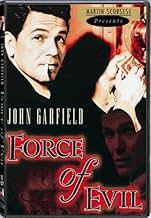An unethical lawyer who wants to help his older brother becomes a partner with a client in the numbers racket.An unethical lawyer who wants to help his older brother becomes a partner with a client in the numbers racket.An unethical lawyer who wants to help his older brother becomes a partner with a client in the numbers racket.
- Awards
- 4 wins total
- Freddie Bauer
- (as Howland Chamberlin)
- Comptroller
- (uncredited)
- Sorter
- (uncredited)
- Sylvia Morse
- (uncredited)
- Sorter
- (uncredited)
- Detective
- (uncredited)
- Mother
- (uncredited)
- Attorney
- (uncredited)
Featured reviews
The relationship is a tragic one. Thomas Gomez must be one of the most underrated actors of his day. He steals every scene he's in with the quick-talking Garfield, who was so good in THE POSTMAN ALWAYS RINGS TWICE. This may be familiar to fans of RAGING BULL, where both sets of brothers in two very different films love each other, but have a difficult time displaying affection.
Two fabulous scenes stand out and would be impossible if shot in color. The first occurs when Garfield stumbles upon a darkened office with his door slightly ajar. The light from his office cuts through the middle of the screen, allowing Garfield to snoop. Another is the shootout at the film's climax, where all of the three shooters are lying in the shadows, creating suspense based on what we cannot see. It is all done in a very impressionistic way, a superb use of lighting and shadow. This is black and white at its best. Pure and evil. A truly great film. I would stay focused on the scenes between Gomez and Garfield. This sad brotherhood plays incredibly against a brilliant backdrop of crime and double-crossing.
FORCE OF EVIL is another reminder of how good Hollywood films of the 1940's were. Without them, we probably would not have the classics of the past 25 years.
The problem is, Joe's older brother Leo (Thomas Gomez) runs one of those smaller booking outfits. He is 50 with heart trouble and Joe figures that loosing his business like this will finish him off. Joe wants to tell Leo outright what is going on so he won't take bets for the 4th of July, but is ordered in no uncertain terms by the head of the syndicate to not tell his brother anything.
It's at this point the film loses its way. I can't tell you WHY anybody does anything from this point forward. For example, Joe tells the cops to raid his brother's bookie joint supposedly to get him to not take bets for the 4th of July, but his brother still gets out of jail before the 4th of July and ends up taking bets for the 4th and going broke anyways. What was the point? Joe takes an outsized romantic interest in a young girl working in his brother's gambling joint - Beatrice Pearson as Doris - even though it is obvious she is not remotely interested in him unless he reforms, and he is not the least bit interested in reforming.
I rated this as above average because of the great noirish photography, good dialogue, and fine acting. It is just too bad it was not in service to a more coherent plot.
Thematically, Marxist Polonsky and co-scripter Ira Wolfert take a shot at the Darwinist world of capital, where big fish survive by eating smaller fish or by muscling in on the catch (Ficco's strategy), while working class minnows offer up dimes and quarters in hopes of instant metamorphosis. It's an ugly world where corruption and greed reach from top to bottom. Since the Production Code of the time couldn't leave matters in an unregenerate state, an upbeat ending is tacked on that defies the logic of what has gone before. Nevertheless, the sharply-etched images remain, vividly - memorably. And it's ironic that any intended remake will have to consider that the biggest fish of all has taken over the numbers racket and renamed it - the State Lottery. I wonder if Polonsky was amused.
Of course the fact that the film was shot totally on location in scintillating black and white noir in New York City, gave it a dimension that no other noir films have, save possibly Night and the City which was also shot on location in London.
John Garfield who was as quintessential a New Yorker as you could get plays Joe Morse, smooth lawyer for a big time racketeer Roy Roberts who is looking to either take over or muscle out the small time policy banks in the numbers racket. One of those banks is owned by Garfield's brother, Thomas Gomez.
Garfield is as ruthless as Roberts, but with a velvet glove. He tries to get Gomez to go along with the syndicate, but Gomez balks. There's also a prosecutor looking into the numbers racket and a tapped phone which figures prominently in the climax.
Given the leftwing polemics of both the star and director Abraham Polonsky, Force of Evil got the attention of the ultra rightwing House Un American Activities Committee. Polonsky was blacklisted for over 20 years and Garfield died under the strain of the investigation.
Given what has happened to the Soviet Union, I wonder if Garfield and Polonsky were alive today what they would say and how they would feel about their work here. It's interesting to speculate.
But as entertainment Force of Evil is a great success and that is the first rule of film. Also look for a good performance by Marie Windsor as Roberts's wife with a yen for Garfield. One of her first femme fatale roles and one of her best.
Sermon over: none of the above gets in the way of a raging, doom-laden crime melo that, like a snowball, gets faster and weightier as it barrels along. Superb New York location photography, a vitriolic script, and committed, sincere performances lock our attention to every second of its 81 New York minutes. If it weren't for Gun Crazy (scripted under a front name by another dangerous pinko, Dalton Trumbo), Force of Evil would be the best film noir ever made.
Did you know
- TriviaIn order to show cinematographer George Barnes how he wanted the film to look, Abraham Polonsky gave him a book of Edward Hopper's Third Avenue paintings.
- GoofsDuring a climactic montage set at an East Coast racetrack on the Fourth of July, people in the stock footage crowd scenes are dressed in winter garments nobody would wear in the middle of summer.
- Quotes
[after Joe bails his brother, Doris and the others out of jail]
Doris Lowry: You know I've got my whole life to think about now and you won't be of any help.
Joe Morse: How do you know? You know everything I touch turns to gold. It's raining out and I promised my brother to take you home.
Doris Lowry: Well, that's a lie.
Joe Morse: Well, it's not true; but I would have had he asked. You know you can't tell about your life 'til you're all through living it. Come on, I'll give you a lift. You're tired, I'm tireder. What can happen to either one of us? You tell me the story of your life and maybe I can suggest a happy ending.
- Alternate versionsAll existing copies of the film are of the version that was cut by 10 minutes in order to fit into a double bill.
- ConnectionsEdited into American Cinema: Film Noir (1995)
- How long is Force of Evil?Powered by Alexa
Details
- Release date
- Country of origin
- Official sites
- Language
- Also known as
- Force of Evil
- Filming locations
- Production companies
- See more company credits at IMDbPro
Box office
- Gross US & Canada
- $948,000
- Gross worldwide
- $1,165,000
- Runtime
- 1h 19m(79 min)
- Color
- Aspect ratio
- 1.33 : 1








































